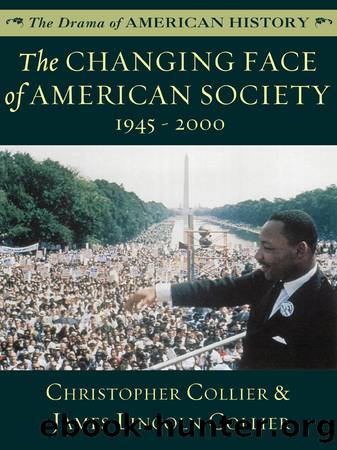The Changing Face of American Society by James Lincoln Collier

Author:James Lincoln Collier
Language: eng
Format: epub
Publisher: AudioGO
Published: 2002-10-14T16:00:00+00:00
The counterculture believed in love, the free expression of emotion, and unconventional clothes and hairstyles. However, their ideals often proved unrealistic: This 1968 love-in held in Los Angeles ended with fighting between celebrants and police.
The term counter means against; culture is the whole set of beliefs, folkways, customs, ways of thinking and doing things that a nation follows. The counterculture of the 1960s, which actually had its greatest effects later, was a movement determined to replace the American culture of the postwar era with a newâand its promoters thoughtâbetter one.
America had been visited by earlier counterculture movements. In particular, in the early decades of the twentieth century, a movement had arisen to throw off the strident morality of the Victorian nineteenth century which had started out as a call for order and decency, but had become overly repressive, inhibiting spontaneity and creating straitjackets of middle-class manners. This earlier counterculture had wanted people to live freer, more expressive lives. The effect was to establish an ethic that put the individual first, instead of the needs of the community.
The counterculture of the 1960s did not grow directly out of this earlier movement, but it was similar in that it pushed the idea of the freedom of the individual to an extreme. It began during World War II, when a tiny handful of rebels at Columbia University in New York City developed a philosophy that held that there was no such thing as right or wrong, good or bad: People ought to be free to try out any kind of experience they felt like.
This tiny group was led by the novelist Jack Kerouac and the poet Allen Ginsberg. They began to experiment with sex, drugs, even crime. They were at first too tiny a group to have any impact, but in 1957 Kerouac's novel On the Road was published to much publicity, and Ginsberg's poem "Howl" was banned in some places, generating more publicity. Kerouac had named the group the Beat Generation, and its followers were dubbed beatniks, or the Beats. Press interest was high, and many young people read "Howl" and On the Road, which expressed the Beat philosophy of living without rules. Many of the basic ideas of the counterculture of the 1960s grew out of the Beat movement.
Download
This site does not store any files on its server. We only index and link to content provided by other sites. Please contact the content providers to delete copyright contents if any and email us, we'll remove relevant links or contents immediately.
The Mayflower and the Pilgrims' New World by Nathaniel Philbrick(4493)
I'm Still Scared by Tomie dePaola(4376)
Bloody Times by James L. Swanson(4363)
Pocahontas by Joseph Bruchac(4247)
Bomb: The Race to Build--And Steal--The World's Most Dangerous Weapon (Newbery Honor Book) by Steve Sheinkin(3934)
Flesh and Blood So Cheap by Albert Marrin(3830)
An American Plague by Jim Murphy(3760)
Little Author in the Big Woods by Yona Zeldis McDonough(3513)
The Giant and How He Humbugged America by Jim Murphy(3441)
Hello, America by Livia Bitton-Jackson(3161)
The President Has Been Shot!": The Assassination of John F. Kennedy by Swanson James L(3088)
Harry Potter: A History of Magic by British Library(3040)
The Landing of the Pilgrims by James Daugherty(2938)
Gettysburg by Iain C. Martin(2829)
The Extraordinary Suzy Wright by Teri Kanefield(2713)
Ben Franklin's Almanac by Candace Fleming(2522)
The Impossible Rescue by Martin W. Sandler(2335)
Bloody Times: The Funeral of Abraham Lincoln and the Manhunt for Jefferson Davis by James L. Swanson(2109)
Who Was Louis Braille? by Margaret Frith(1976)
